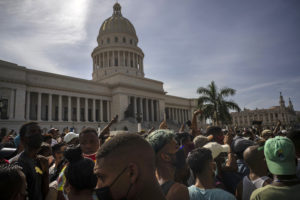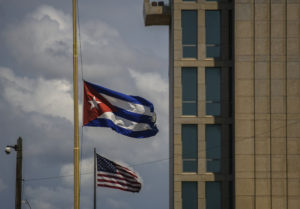By Clay Boggs and Geoff Thale
Foreign observers of Cuba continue to debate the economic reforms underway on the island. Advocates of engagement with Cuba argue that the process of economic change is real, even if it is moving slowly. Skeptics—especially those who believe, or would like to believe, that the Cuban government is on the verge of collapse—argue that the change is superficial, or temporary, or that it is moving too slowly. This is an important debate that shapes our understanding of what’s happening in Cuba and how the rest of the world should respond.
Based on what we’ve seen in Cuba, we at WOLA think that the process of change is both real and meaningful. The changing realities on the ground should play a greater role in informing U.S. policy towards Cuba, which has long advocated for changes in Cuba’s economic structure. U.S. policymakers ought to respond when such changes take place.
At the same time, the changes underway have potentially profound implications for the daily lives of working people in Cuba, who will be confronted with new and unsettling realities in terms of job security, unemployment, social welfare, and other issues. How the Cuban people and the Cuban government will address these questions is a major issue and one that is too-little discussed.
In late January, WOLA staff traveled to Cuba on a research trip. Most of the people we spoke to in Cuba—journalists, academics, religious leaders, diplomats, and everyday Cubans—agreed that the changes are real and meaningful. But they raised important questions about what those changes will mean for Cuban society. How will Cuba deal with rising inequality? Will workers in the growing private sector have labor protections? What will happen to those who are left behind in Cuba’s new economy? These are questions that leave many Cubans anxious and uncertain. The Cuban government has acknowledged many of these concerns but has yet to give a detailed response about how it intends to address these issues.
It is widely believed that income inequality in Cuba (still very low by world standards) will continue to rise as a result of the economic reforms. Many workers in the tourist sector already earn much more than state-sector professionals, which creates a set of perverse incentives for young Cubans. (Many wonder why they should attend college when they can make significantly more as a taxi driver or a waiter than as an academic or an engineer in the state sector.) Many of the sources we spoke with in Cuba are concerned that these inequalities will continue to grow. They expect that foreign investment will increase and that an ever-larger group of Cubans will see their income rise from employment in the private sector, from small business ownership, or from property sales. This will have ramifications for Cuba’s new tax system, but it remains unclear what changes might be undertaken in the context of rising income inequalities. There are also questions about whether the Cuban government has the regulatory capacity or political will to implement those changes.
Cubans have long relied on guaranteed employment and state subsidies as a means to ensure basic survival in a very challenging economy. However, the Cuban government has indicated that it is committed to substantially modifying this system. It plans to lay off a million and a half state workers in the coming years. (In fact, this process has already begun, but the pace has been slower than what was originally announced.) The government expects that self-employment will absorb most of the workers who will be laid-off and has already issued over 350,000 licenses for private entrepreneurs. But the absorption of the unemployed into the private sector will be complicated. Some state employees deemed to be inefficient or redundant may not have the entrepreneurial skills or enthusiasm to become self-employed. The development of credit mechanisms for those who seek to start their own businesses is only beginning. Regulations permitting the hiring of employees are in their initial stages and will require additional work and revision. Hence, the government will have to address a new problem: unemployed workers without income guarantees. Moreover, cuts to the ration cards are widely expected. What mechanisms will the Cuban government use to replace this? It’s not entirely clear. The new motto is “subsidizing people, not products,” implying a shift toward targeted social benefits and away from the principle of universal benefits. But none of the Cubans we met believed the government had a clear plan for how to make that transition.
Cuban workers in the emerging private sector also face a great degree of uncertainty. While the Cuban Labor Federation (Central de Trabajadores de Cuba, CTC) certainly has faults, it does provide a basic framework of protection for workers in the state sector and mechanisms for input into workplace decisions. What will happen to workers in the emerging private sector (both the self-employed and those who are employed by new small business owners)? The CTC will have to determine how it intends to represent these workers and the Cuban government will have to design regulations to shape wages and hours, working conditions, and union representation in the private sector. How the CTC will attempt to represent the needs and interests of all Cuban workers in the coming years is very much an open question.
These questions about social protections and workers’ rights are not, of course, unique to Cuba. But the Cuban government and Cuban society have what is perhaps a unique opportunity to address these issues in a thoughtful way, as a gradual process of economic change takes place.
The journalists, academics, and religious leaders that we spoke with agreed that Cuban authorities are not committed to moving towards one particular economic model. Instead, the government is improvising, responding to economic realities and to the pressure from the population in terms of creating better opportunities. Despite Cuba’s real problems in terms of human rights and freedom of expression, the government appears to be providing some space for debate and public participation on the issues of how to improve the economic situation.
In the coming months and years, it will be important to follow the process of economic reforms in Cuba closely. WOLA will continue to monitor the pace and extent of these reforms. We will also be asking questions about income inequality, about the social safety net, and about labor protections. There is no doubt that significant changes are underway in Cuba today, and WOLA will continue to provide critical analysis based our research in field.
_______________________________________________________________
Clay Boggs is WOLA’s Program Assistant for Cuba and for Rights and Development. He recently visited Cuba on a research trip.
Geoff Thale is WOLA’s program director. Mr. Thale has studied Cuba issues since the mid-1990s and traveled to Cuba more than a dozen times, including organizing delegations of academics and Members of Congress.



